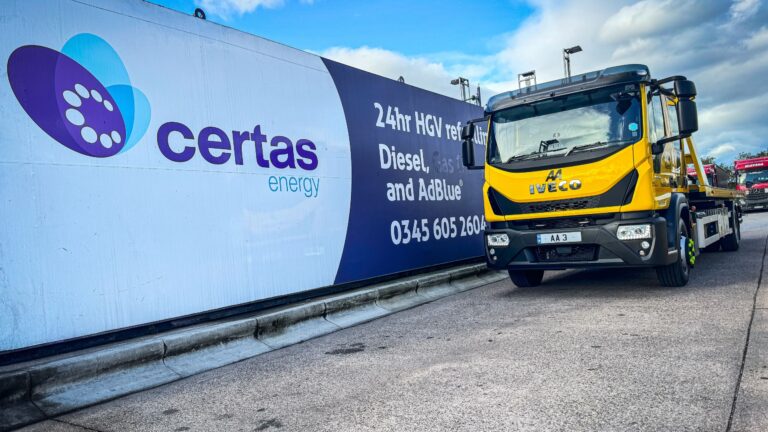
A test of the fuel in the AA’s recovery lorry fleet has been so successful that three trucks are expected to surge to 27 by the end of the summer. Potentially ramping up CO2e savings to approaching 1300 tonnes a year, it helps propel the AA towards its target of net zero by 2035.
Test and scale
As part of its award-winning, innovative “test and scale” approach to fleet decarbonisation, The AA has increased the number of vehicles included in its trial of hydrogenated vegetable oil (HVO) from three to 15 to further test the viability of this alternative fuel to deal with roadside recovery demands in real-world settings.
If the trial extension proves successful the number of vehicles will be further extended later this year to 27, meaning more than 10% of its flatbed recovery trucks will then be fuelled by HVO. With a varied operational fleet of over 3,000 vehicles, which make up 95% of the organisation’s scope 1 and 2 emissions, decarbonisation is critical to The AA achieving its net zero by 2035 target.
During the first 12 months, The AA trial has used over 66,000 litres of HVO to fuel over 210,000 miles of driving. AA vehicles running on HVO have seen a 95% reduction in carbon emissions at the point of use, returning a saving of 165 tonnes of CO2e emissions when compared with same model diesel counterparts. Over the second year of testing, this figure could rise to over 700 tonnes if the vehicles added to the trial perform similarly. The vehicles included have also delivered favourable results in terms of improved MPG.
Added benefits
In addition to emissions and fuel savings, The AA’s Fleet Engineering team is confident that there are other benefits to be gained from the use of HVO, namely a reduction in maintenance costs due to a reduction in the number of DPF (Diesel Particulate Filter) regenerations required as HVO burns much cleaner than diesel.
One major benefit outside of the trial to measure emissions is the fact that there are no modification costs to diesel fleet owners, meaning fleets running on HVO that experience supply challenges could simply top up with diesel until suitable quantities of HVO are sourced.
With roadside assistance and recovery at its heart, The AA has complex vehicle needs, including specific towing requirements and many current EVs, particularly vans, don’t offer this capability. This has led the organisation to invest in a sector-leading programme of alternatively fuelled vehicle trials to establish what best meets their requirements, of which HVO trucks is one part.
Duncan Webb, The AA’s Head of Fleet, said: “Decarbonising is a business priority, and we’re committed to reaching our 2035 net zero target, so fleet innovation and exploration are key to this journey.
“Our HVO trial is just one part of a wider push to collaborate with manufacturers and suppliers to identify solutions that will meet the demands of roadside recovery as well as help to decarbonise our fleet. Already, HVO is proving to be an important contributor to our decarbonising aims whilst achieving the high levels of performance out customers expect.
“We’ve seen some fantastic results in terms of miles per gallon and a 95% emissions reduction. This, coupled with no impact on the operational performance of the trucks, the HVO price premium falling, HVO availability improving and signs of fuel efficiency gains, means we’re keen to extend our trials. HVO is proving to be an exciting part of our alternative fuel “test and scale” programme and I’m looking forward to seeing what the next six months bring.”
Certas partnership
Since January 2024, The AA has had three fully operational trucks using HVO in Greater Manchester, operated in partnership with Certas Energy, utilising its HGV refuelling sites.
The increase in the number of vehicles involved in the HVO trial follows on from the recent announcement from The AA that it is embarking on its first major trial of plug-in vans for roadside recovery. The organisation has added 15 battery electric vehicles (BEVs) and 15 PHEV Ford Transit Customs into its roadside service fleet, which will be operational across the country. As part of the trial, all patrols will have home chargers installed supported by Rightcharge.
Image supplied by The AA